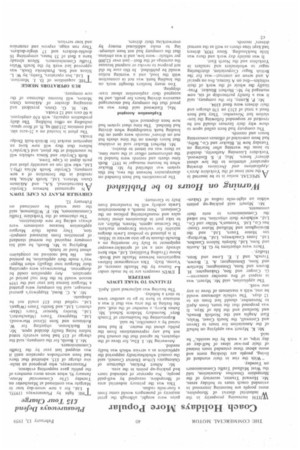Warning on Hours
Page 42

If you've noticed an error in this article please click here to report it so we can fix it.
to be Published A SPECIAL notice is to be inserted in 1—ithe next issue of the Yorkshire Area's Applications and Decisions drawing operators' attention to the law about drivers' hours. Maj. F. S. Eastwood, Yorkshire Licensing Authority, decided to issue the warning after hearing on Tuesday how H. Blacker and Co., Selby, had been convicted of offences concerning hours and records.
The company had been called upon to show why their licences should not he revoked or suspended following the 'conviction last November. They had been fined a total of £313 on 170 charges and their drivers were fined £104.
Mr. P. Kenny, for the company, said it was a family partnership of six, now managed by Mr.. Herbert Blacker. Practically the whole of the work of their vehicles—five on A licence, five on special A and seven on contract—was for the British Sugar Corporation, distributing sugar to wholesalers and retailers in Yorkshire and the North East.
It was mainly day work and there was little backloading. Since 1939, drivers had kept time sheets as well as the normal drivers' records.
c2 The prosecutions had been founded on discrepancies between the two, but this system was inherited by Mr. Blacker when he became manager in 1957. Both time sheets and records were handed to the enforcement officer at the same time, so there was no intent to deceive.
Mr. Herbert Blacker said in evidence that hours shown on the time sheets but not on drivers' records were spent on the loading bank transhipping when driving had finished. The time sheet system had now been dispensed with.
Explanation Accepted
Maj. Eastwood said there was no proof that the company had encouraged excessive driving hours for profit, and he accepted their explanation about transhipping.
Too many hauliers thought work on the loading bank was not in connection with the load, and a warning notice would be published. In this case he did not propose to revoke or suspend because the earnings of the fleet—just over £2,000 per vehicle—were low, and it was obvious, that the company had not been attempting to make additional money by overworking their drivers.
















































































































